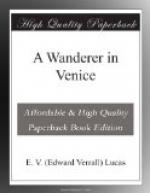Needing solitude for this task, the composer came to Venice in the autumn of 1858, and put up first at Danieli’s. Needing a more private abode he came here. From his Autobiography I take the story. “I heard that one of the three Giustiniani palaces, situated not far from the Palazzo Foscari, was at present very little patronized by visitors, on account of its situation, which in the winter is somewhat unfavourable. I found some very spacious and imposing apartments there, all of which they told me would remain uninhabited. I here engaged a large stately room with a spacious bedroom adjoining. I had my luggage quickly transferred there, and on the evening of the 30th August I said to myself, ‘At last I am living in Venice.’
“My leading idea was that I could work here undisturbed. I immediately wrote to Zuerich asking for my Erard ‘Grand’ and my bed to be sent on to me, as, with regard to the latter, I felt that I should find out what cold meant in Venice. In addition to this, the grey-washed walls of my large room soon annoyed me, as they were so little suited to the ceiling, which was covered with a fresco which I thought was rather tasteful. I decided to have the walls of the large room covered with hangings of a dark-red shade, even if they were of quite common quality. This immediately caused much trouble; but it seemed to me that it was well worth surmounting, when I gazed down from my balcony with growing satisfaction on the wonderful canal, and said to myself that here I would complete Tristan.”
The composer’s life was very simple. “I worked,” he says, “till two o’clock, then I got into the gondola that was always in waiting, and was taken along the solemn Grand Canal to the bright Piazzetta, the peculiar charm of which always had a cheerful effect on me. After this I made for my restaurant in the Piazza San Marco, and when I had finished my meal I walked alone or with Karl along the Riva to the Giardini Pubblici, the only pleasure-ground in Venice where there are any trees, and at nightfall I came back in the gondola down the canal, then more sombre and silent, till I reached the spot where I could see my solitary lamp shining from the night-shrouded facade of the old Palazzo Giustiniani.
“After I had worked a little longer Karl, heralded by the swish of the gondola, would come in regularly at eight o’clock for a few hours chat over our tea. Very rarely did I vary this routine by a visit to one of the theatres. When I did, I preferred the performances at the Camploi Theatre, where Goldoni’s pieces were very well played; but I seldom went to the opera, and when I did go it was merely out of curiosity. More frequently, when bad weather deprived us of our walk, we patronized the popular drama at the Malibran Theatre, where the performances were given in the daytime. The admission cost us six kreutzers. The audiences were excellent, the majority being in their shirt-sleeves, and the pieces given were generally of the ultra-melodramatic type. However, one day to my great astonishment and intense delight I saw there Le Baruffe Chioggiote, the grotesque comedy that had appealed so strongly to Goethe in his days at this very theatre. So true to nature was this performance that it surpassed anything of the kind I have ever witnessed.”




